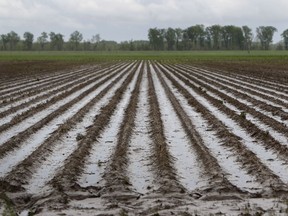Quebec market gardeners are switching to less risky large-scale crops
Quebec #Quebec

Breadcrumb Trail Links
Extreme weather has ruined crops for farmers, and that has farmers’ associations worried about the future.
Author of the article:

La Presse Canadienne
Pierre Saint-Arnaud
Published Nov 06, 2023 • 3 minute read
 Soggy farmland is seen in Commerce, Mo., on April 27, 2011. Vegetable and berry producers in southern Quebec are asking for government help amid torrential rains that have hit the province this summer, causing heavy losses. Photo by Jeff Roberson /THE ASSOCIATED PRESS
Soggy farmland is seen in Commerce, Mo., on April 27, 2011. Vegetable and berry producers in southern Quebec are asking for government help amid torrential rains that have hit the province this summer, causing heavy losses. Photo by Jeff Roberson /THE ASSOCIATED PRESS
The threat that climate change poses to Quebec’s food security is no longer theoretical: the Association des producteurs maraîchers du Québec (APMQ) says its members, severely affected by extreme weather events, are producing less and less food for Quebecers.
“Producers are reorienting their activities to large-scale cultivation where the capacity to operate a farm and risk management are much less important than for a market garden farm,” says the association’s general manager Patrice Léger Bourgouin. Large-scale cultivation crops include grain corn, soybeans, cereals, forage crops and beans, among others.
Advertisement 2
This advertisement has not loaded yet, but your article continues below.
THIS CONTENT IS RESERVED FOR SUBSCRIBERS ONLY
Subscribe now to read the latest news in your city and across Canada.
SUBSCRIBE TO UNLOCK MORE ARTICLES
Subscribe now to read the latest news in your city and across Canada.
REGISTER TO UNLOCK MORE ARTICLES
Create an account or sign in to continue with your reading experience.
Article content
Article content
The torrential rains this summer had a catastrophic effect for a majority of produce farmers growing small fruits, vegetables for processing and root vegetables like potatoes.
A survey carried out among 250 producers shows significant production losses, with a majority of crops affected not only by rain, but also by frost or hail.
Three-quarters of respondents detected fungal diseases in their crops, a majority expect losses from storing waterlogged produce and half of respondents anticipate difficulties next summer due to rotten plants standing, broken, uprooted or affected by disease.
Anticipated income has melted like snow in the sun, leaving insufficient liquidity not only to buy what they need for next summer, but also to make it through the year.
Even if the summer was one of the worst, with its fields transformed into immense lakes of mud where even the tractors got stuck, it is part of a series of difficult summers which lead these producers to look elsewhere.
“What has worried us for several years is to see more and more market gardeners replacing their traditional culture with large crops and, slowly but surely, this is a loss of land for food production for humans,” Léger Bourgouin said.
Headline News
Thanks for signing up!
Article content
Advertisement 3
This advertisement has not loaded yet, but your article continues below.
Article content
This movement is also fuelled by the need to ensure succession, with the next generation wondering about its future in market gardening with this unforgiving weather.
“It is much easier to seek bank financing for young people to buy their parents’ farms if they have an activity in large-scale cultivation,” Léger Bourgouin said.
“For the banker, who is allergic to risk, the contribution in equipment, in human resources in the field, in inputs is much less in large-scale cultivation than in market gardening. The risk is much lower, since prices are transferred to international markets on the Chicago Commodity Exchange.”
Agriculture Minister André Lamontagne created a special working group in August with his officials, the Union des producteurs agricoles (UPA) and Financière agricole, whose first task was to draw up a portrait of the situation.
In addition to detailing the agricultural devastation, the survey paints a worrying portrait of the deterioration in the financial situation of these producers. “The financial consequences for businesses are serious and worrying, even going so far as to compromise the future of several farms,” said UPA president Martin Caron, who is calling for “exceptional, rapid, and commensurate” aid outside existing programs.
Advertisement 4
This advertisement has not loaded yet, but your article continues below.
Article content
The producers’ associations say current risk management programs “do not allow companies to face extreme climatic situations,” said Francis Desrochers, president of Quebec’s potato producers’ association.
Moreover, 52 per cent of companies in these sectors do not participate in crop insurance, on the one hand because it does not cover several harvests and, on the other hand, “because it is poorly suited to their economic conditions and current weather conditions,” Léger Bourgouin said. “These programs were essentially developed 30 years ago in a context that is not at all adapted to the reality of today’s climatic events.”
Producers are impatiently awaiting Finance Minister Éric Girard’s economic update on Tuesday. He promised that adapting to climate change would be one of the priorities.
Related Stories

Quebec farmers seek government aid as crops devastated by heavy rains

Difficult growing season could be hard on farmers’ mental health
Article content
Share this article in your social network
Comments
Postmedia is committed to maintaining a lively but civil forum for discussion and encourage all readers to share their views on our articles. Comments may take up to an hour for moderation before appearing on the site. We ask you to keep your comments relevant and respectful. We have enabled email notifications—you will now receive an email if you receive a reply to your comment, there is an update to a comment thread you follow or if a user you follow comments. Visit our Community Guidelines for more information and details on how to adjust your email settings.
Advertisement 2
This advertisement has not loaded yet, but your article continues below.
Advertisement 1
This advertisement has not loaded yet, but your article continues below.